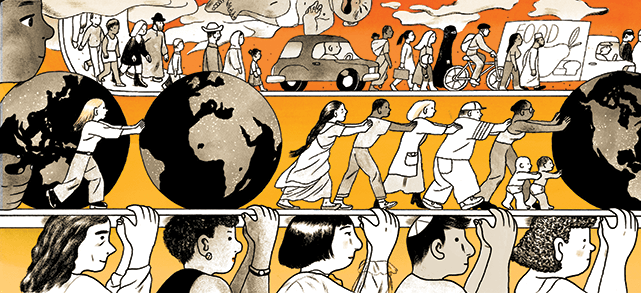Twenty years ago, I and a small group of undergrads from various American universities flew into Lagos on a muggy January evening. We were the wide-eyed and eager dregs of an international exchange program – Nigeria, then under military dictatorship and benighted by corruption was the program’s least popular destination.
Having made our way through Lagos’ dingy airport, we were transferred by van to a hostel. As night fell we drove through a seemingly never-ending street market, a sea of Nigerians selling every conceivable thing out of baskets balanced on their heads, carts and mobile stalls. It was my first taste of the so-called Third World. I had never seen humanity on that scale and it was overwhelming.
Living in the West, the population explosion that has taken place in the last century reaches us in the form of numbers. Lagos, 10 million people when I visited it, is now home to 21 million. By 2100, the United Nations expects Nigeria at an estimated 914 million to be the world’s second-largest country after India and before China. The UN’s most recent projection envisions the world population in 2100 at 10.9 billion. That’s the medium variant; the high variant projects 16.6 billion, the lower 8.3 billion, depending on fertility rates, over which demographers bicker endlessly.
It all seems pretty abstract. But as the world’s population, currently at 7.2 billion, continues to grow, we’re becoming more aware of its impact: climate disruption, plant and animal species extinction, land degradation, ocean acidification, the spread of toxic compounds, increased susceptibility to infectious diseases, groundwater depletion and resource wars. It’s a depressing litany for which history offers little consolation; we’re not talking about the rise and fall of a regional civilization, like the Mayan or Egyptian, but the potential collapse of a global one.
Humans are good at denial. We’re also good at blaming others. And as British environmentalist and occasional Corporate Knights contributor George Monbiot points out, the rich white Western men that dominate the population control conversation are more inclined to blast the breeding habits of far-away brown people than to acknowledge the impact of their own overconsumption. The uncomfortable fact is that I, with my trans-Atlantic, first-worldly existence, will have consumed a whole lot more of the world’s resources in the last 20 years than probably all the yam vendors on that street market combined. In fact, Paul Murtaugh, statistical ecologist at Oregon State University, estimates that an American born today will produce a carbon footprint 86 times that of a Nigerian down the generations.
This fact can’t be taken to condone population growth in the developing world, providing it remains poor. Population-curbing support to the developing world is indeed worthwhile but it won’t solve the problem of overpopulation, let alone begin to address the arguably more egregious one of overconsumption. Begging the question of what, if anything, will.
Humankind is not grappling with this problem for the first time. Ever since populations began blossoming in the Industrial Revolution, cautionary voices have been raised. Writing in 1798, Reverend Thomas Malthus predicted that with human numbers increasing exponentially and food supply growing arithmetically, mankind was headed for a catastrophic crunch. Being a man of the cloth, Malthus’ recommendations were of a moral nature – abstinence and delayed marriage – but his morality did not extend to the poor or “defective” whose reproduction he thought should be forcibly prevented. Otherwise and less desirably, Malthus believed that war, disease or starvation would take care of the overpopulation problem.
While the Malthusian catastrophe was averted by advances in agriculture and birth control and his thinking subsequently roundly denounced for its pessimism and inhumanity, the notion that the unwashed masses threaten the well-being of the rich has proven remarkably tenacious. And his basic tenet, that human population will ultimately outstrip global resources, has gained currency with time. During the postwar boom of the last century as the world’s population growth peaked, reaching a 2.2 per cent annual increase in 1963, the World Bank, UN and major American philanthropic foundations made population control in the Third World top priority, more or less deaf to calls that what was needed as much as contraception was development aid aimed at reducing poverty and child mortality and improvements in women’s health and education. Soon developing countries were taking matters into their own hands. When Indira Gandhi declared a state of emergency in 1975, her son and advisor Sanjay implemented a sterilization program – initially voluntary and then forced – in which over eight million Indian men are said to have been snipped. In 1978, China introduced its one-child policy, which was only eliminated fully last month. It was credited by the Chinese government with having prevented the births of 400 million people.
The extent to which these measures kept the numbers down is debatable. Many, including Karan Singh, India’s health minister under Gandhi, maintain that it was advances in development more than sterilization and abortions that put Indian population growth in check – consider the difference between fertility rates in developed southern states like Kerala (1.6 children born per woman) versus impoverished northern ones like Bihar (3.4). Likewise, demographers of China will point out that fertility rates were already in decline when the one-child policy was introduced, and that with urbanization and poverty reduction, the population was bound to drop.
Not only is their efficacy questionable, such coercive measures cause collateral damage. The selective abortion of girls which has drastically skewed China’s gender balance, the notorious abuse of power by local bureaucrats trying to fill quotas or their own pockets by kidnapping and selling “illegal” children for international adoption – all these offend Western (Christian, human rights, feminist, democratic) sensibilities to the point that even today’s most vehement population control advocates won’t defend them.
India’s health minister maintains it was advances in development more than sterilization and abortions that put Indian population growth in check.
American ecologist Paul Ehrlich, for instance, who in the 1960s supported certain forms of coercion, including suspending food aid to countries deemed “hopeless,” now talks less about adding sterilants to drinking water than about empowering women and reversing wealthy countries’ tax systems so that additional children cost more. A biologist and butterfly specialist at Stanford University, Ehrlich is in no way anti-life. But he fears the worst and, within a generation, his concerns have migrated from the margins to the mainstream.
In his 1968 best-seller The Population Bomb, Ehrlich predicted that global overpopulation was going to cause imminent catastrophe in the form of widespread disease, famine and/or war. His critics don’t tire of reminding him that none of this came to pass. But as with Malthus, Ehrlich’s prognosis was followed by something of a miracle – the Green Revolution – in which agricultural yields and thus food supply were dramatically increased particularly to those parts of the world that needed it most.
But even Norman Borlaug, the so-called father of the Green Revolution, described these gains as “bought time” and took his 1970 Nobel Lecture as an opportunity to warn of the ongoing “magnitude and menace of ‘the Population Monster’.” Today, with 852 million people suffering chronic malnourishment, the vast majority in developing countries, Borlaug’s concerns have been validated.
It’s unlikely that the world is going to be blessed with another miracle. In fact, as Alan Weisman points out in his just-published Countdown: Our Last, Best Hope for a Future on Earth?, the next two billion people are going to have a more devastating impact on the planet than the last two billion did, as we scrape the bottom of various resource barrels. Modern-day cornucopians and free-market environmentalists who claim that technological advances will continue to support unfettered consumption of energy, food and stuff sound like increasingly deranged voices in a rather barren wilderness. Carbon capture, ethanol, genetically modified organisms, space colonization – none of these advances, if that’s what they are, are going to rescue us from ourselves. We are faced with the most inconvenient truth that we might actually have to change our own habits.
Is it too late, or as a paper Ehrlich recently presented to the Royal Society in London cheerily asked: “Can a collapse of global civilization be avoided?” Despite a grim collective assessment of the current state of affairs – Prince Charles calls humankind’s current behaviour an “act of suicide on a grand scale” – Ehrlich and others find reason for hope.
For one thing, population growth rates are steadily dropping. In the last 60 years, women have gone from having an average of 6 to 2.5 children. Population numbers will continue to increase as the postwar bulge works its way through the system, but fertility rates continue to fall. The burgeoning middle classes in China, India and Africa – increasingly educated and urbanized – are having fewer children than their foremothers. And they’re not behaving as badly as we sometimes claim; in 2012, China committed to put a quarter of its land mass under ecosystem protection.
Furthermore, Ehrlich applauds Europe’s negative population growth and calls on wealthy countries to dispense with early retirement and to plan for rather than bemoan their aging populations. “It’s easier for a 70 year old to be economically productive than a 7 year old,” the 81-year old professor said in a recent phone conversation from California, before jumping on a plane to Australia and New Zealand for lectures, conferences and field work.
The biggest challenge, Ehrlich believes, is to wean the economic system off its addiction to growth. Steady-state economic systems have to be designed and, trickier, sold to a consumer-driven public. Ehrlich makes a plea for a culture of “foresight intelligence” which would eclipse short-term selfishness, enabling people to pay a price today for benefits that will accrue to others tomorrow. Too bad that can’t be sprinkled in the drinking water.
According to Sara Parkin, a further challenge is the male domination of the population debate. The former British Green and founder of the sustainability charity Forum for the Future has observed in her careers as both nurse and politician that men simply can’t talk about sex. They prefer calling for “chalk boards and dollar bills” than anything to do with the reproductive act. While for Parkin, the key lies in contraception.
“Look at Cleopatra,” Parkin exclaims. “She saw half an orange and thought womb cup.” Perfectly shaped and acidic to boot.
Parkin would love to debunk the myth that poor women want lots of children. Poor women are acutely aware of mouths to feed; they simply want children that survive to adulthood. She believes that if women have constant access to contraception – not predicated on roads that wash out, refrigeration that fails and spouses that won’t comply, as is still the case in much of the world – global population could be brought down to the UN’s lowest projection trajectory by 2100.
Honking our way through that chaotic Lagosian street market 20 years ago, I remember thinking of my grandmother, who had fretted about my going to Nigeria. For her, the place was a something of a black hole. A fan of Silent Spring author Rachel Carson, she kept a huge garden at her home in the countryside outside of Hamilton, Ontario, where a rainbow sticker on the front door reassured visitors: “You are entering a nuclear-free zone.”
Every generation has its challenges. My grandmother had six children, but none of her 13 grandchildren have had more than three. In fact, most of my cousins, in their 30s and 40s, are childless. And there hasn’t been nuclear war.
No doubt, with enlightened (and maybe a little more female) leadership, global population can be kept under control, too.







